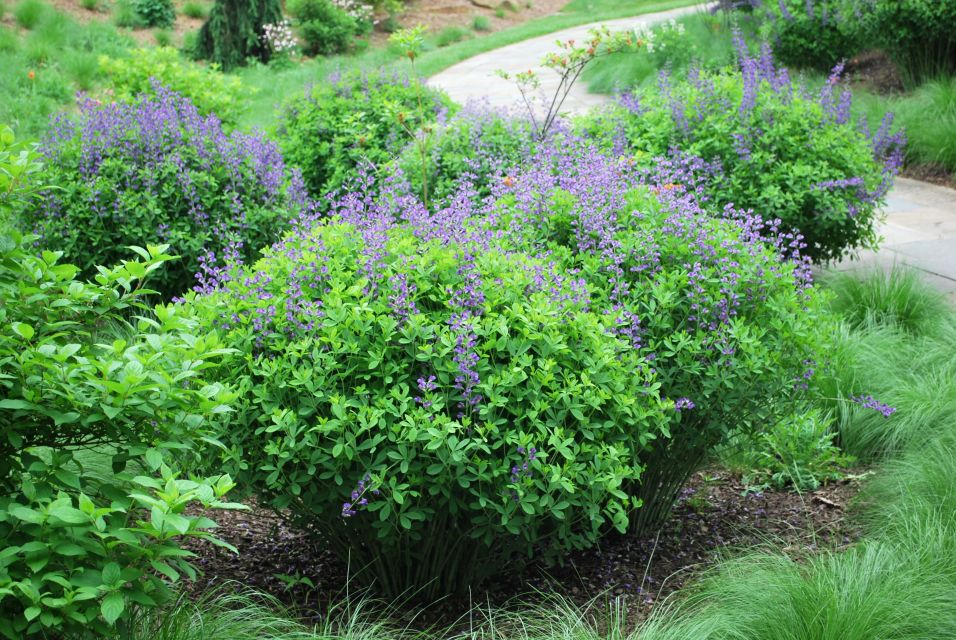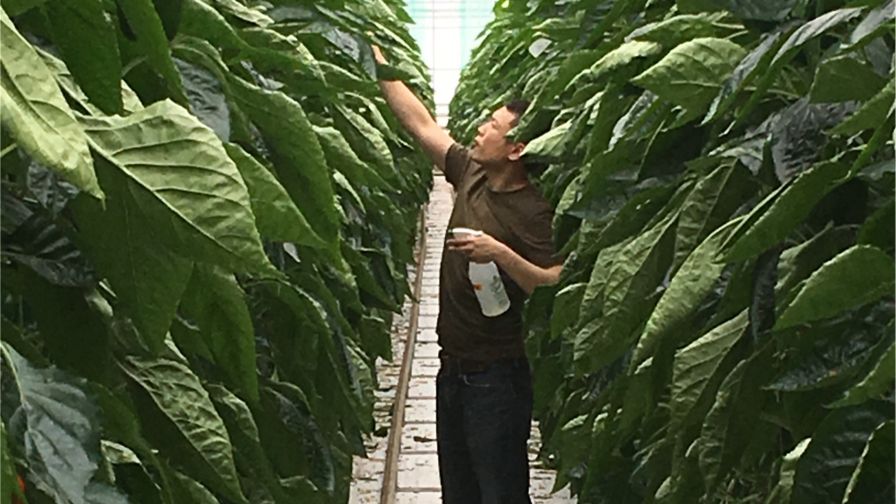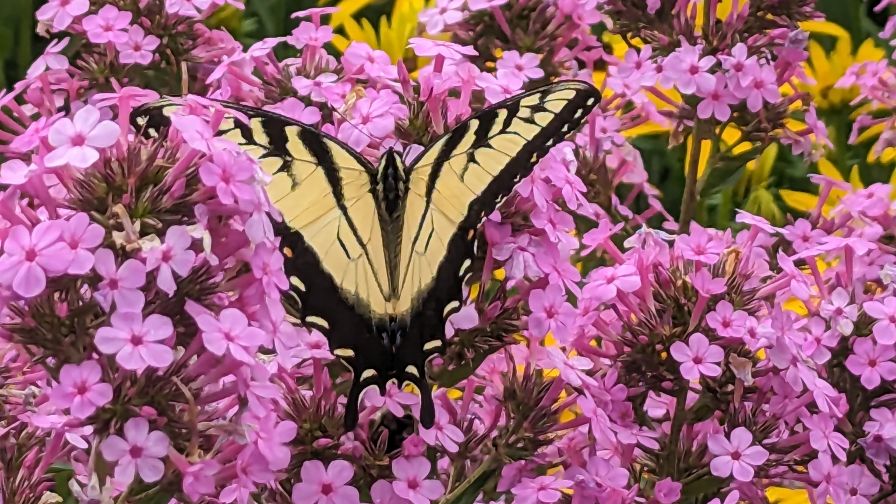Up Close And Personal With Head Grower Of The Year Albert Grimm
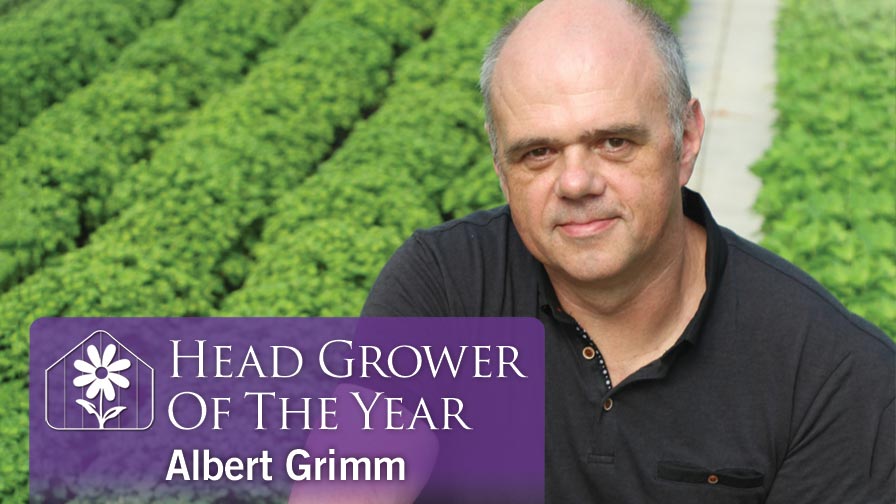 Albert Grimm has traveled many long roads on his way to becoming head grower at Jeffery’s Greenhouses in St. Catharines, Ontario, Canada. This includes multiple trips back and forth between Canada and his native homeland of Germany. Along the way, he’s learned how to hone his craft and become a truly innovative plant grower.
Albert Grimm has traveled many long roads on his way to becoming head grower at Jeffery’s Greenhouses in St. Catharines, Ontario, Canada. This includes multiple trips back and forth between Canada and his native homeland of Germany. Along the way, he’s learned how to hone his craft and become a truly innovative plant grower.
For Grimm, however, being a grower doesn’t simply mean being able to produce a high-quality plant. It’s also about knowing how to lead a great team by instilling a sense of confidence in each member, and it’s about providing consumers with plants they can feel confident about buying. Finally, perhaps the most important aspect of being a great grower is welcoming the next generation into an industry that can be both challenging and rewarding.
From Growing Plants To Growing People
In 35 years of greenhouse work, Grimm has covered just about every part of the industry: he’s worked in small garden centers and large mass production operations, and he’s grown vegetable transplants, market vegetables, greenhouse tomatoes, cut flowers, perennials, nursery crops, flowering potted plants, and bedding plants.
After graduating from high school in Germany, Grimm says horticulture was not his first career choice.
“I had wanted to study physics, but did not have the financial means to attend university,” Grimm says. “As a second choice, I entered into a greenhouse horticulture apprenticeship, because it provided me with income, and because my father had been a greenhouse grower.”
Grimm started out in a retail garden center in Germany, growing ornamentals and market vegetables. He then worked for two years in the greenhouse of a psychiatric hospital, where his job was to assist in horticultural work therapy for the patients.
Grimm first came to Canada in 1986, and worked at a nursery and landscape operation on Cape Breton Island. After returning to Germany, he was employed by a Canadian Army Base, and worked as a gardener for the VIP homes of commanding officers.
In 1988, he emigrated back to Canada and worked for two years in greenhouse tomato production in Quebec. Through the early 1990s, he grew flowering potted plants and annual bedding plants in Southern Ontario.
“In German tradition, a good plant grower is expected to gather experience by apprenticing not just with a single employer, but by working with and learning from a number of experts before settling into a steady career,” Grimm says. “I believe that the broad variety of crops and experiences on my resume has given me tremendous advantages in reaching my goals.”
Since 1998, Grimm has been working with Jeffery’s Greenhouses, and his role within the company has steadily evolved over the years. He started very hands-on, growing crops, supervising and teaching growers, and developing nutrition, climate, and pest control routines. As the production cycle became more complex, he learned how to delegate much of the day-to-day grower tasks, and concentrated on developing and optimizing production programs and crop schedules. More recently, he has turned his focus toward soft skills, such as mentoring and teaching staff not just with respect to their horticultural skills, but increasingly helping them to become better supervisors, mentors, and teachers themselves.
“You might say that my focus shifted very slowly from growing plants to growing people,” he says.
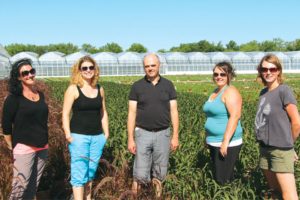
Albert Grimm is quick to emphasize that the success of Jeffery’s Greenhouses is less about him and more about the entire production team, including (left to right): Laura Hall, Maxine Murphy, Albert Grimm, Emma Johnston, and Stephanie Fast.
Teaching The Next Generation
During the 1990s, Grimm says that greenhouse horticulture had a serious image problem in the job market. There were few serious career prospects; the jobs that were available were not competitive in salary with other industries; and growing plants was not generally considered a professional occupation.
Consequently, he says, the industry missed out on attracting highly qualified high school graduates, and was gradually facing a serious shortage of young but highly qualified growers.
“We have put a lot of effort into changing this image, and this is beginning to show results,” Grimm says. “We have promoted professional self-consciousness and self-respect among greenhouse horticulturists. We have been offering post graduate education programs promoting continued learning, and our local community college has probably the best greenhouse horticulture program in the country, with graduates from the program becoming coveted industry specialists.”
Grimm is involved with Niagara College, not only as an instructor but part of the Advisory Committee for the Greenhouse Program. He promotes co-op placements and often introduces students to his staff, promoting a learning environment. He has also been involved with the Secondary District School Board, working with educating youth in trade-oriented careers.
Grimm is also a member of the Canadian Greenhouse Conference Committee, dedicating time to host seminars at conferences locally and beyond. He helps plan and participates as an instructor in evening workshops held at the local Vineland Research Station for all members of the industry wanting to learn more about specific topics.
One Chance To Reach Your Consumer
Grimm fully believes that growers are making a mistake if they are merely trying to sell plants.
“The value in garden and houseplants is not in the plant itself, but in the lifestyle experience they provide,” he says. “With every plant that leaves our farms, we have one chance to provide a consumer with a pleasing experience. This consumer is more likely to spend money on repeat purchases if our products are of adequate quality.”
For this reason, Grimm says every indication of repeat purchases and any feedback from consumers is a reason for pride, because it indicates renewed interest in plants and in gardening.
One recommendation Grimm makes to both his staff and his wholesale customers is something that he learned from one of his former employers.
“He said we need to take at least one plant out of our own production, take it home, put it in our home or backyard, and grow it like a consumer would, in less than ideal conditions. This will enable us to see what the consumer sees. It’s not about how the product looks when it leaves the greenhouse. It’s about whether consumers will be happy with it when they take it home.”
Grimm admits he uses every opportunity to advocate for more focus on shelflife, quality, and consumer satisfaction when speaking with colleagues and industry members.
“I am very vocal about this, and it has not always won me new friends, but I genuinely feel that we have to remember that our customer is the consumer, not just the wholesaler or mass merchant.”
Learning By Trial And Error
This education process isn’t just an outward approach; it’s also necessary to keep yourself educated, Grimm says.
“The need to stay up to date is one of the reasons that I began to teach horticulture on a variety of platforms,” Grimm says. “When we teach a subject, we have to be comfortable with the subject matter, or else we won’t be credible to our students.”
It is amazing, he says, how quickly students can spot weakness in the knowledge of teachers, and such challenges from your audience are very effective motivators for continued learning.
“When a student asks me a question for which I have no answer, I need to dig myself into the subject, until I am convinced that I have a solid answer.”
It’s a constant process, says Grimm, who admits struggling with it at times.
“A lot has to do with internal trials, like in the area of biological controls,” Grimm says. “There’s so much unknown about biological agents and their behavior. It’s very complex. We’ll hear something at a tradeshow, research it, discuss it in our group, and try it to see what happens.”
The job of a grower, Grimm says, is not to do everything right, but to avoid anything from going wrong. Consequently, it helps if a grower has a personality that is a bit perfectionist and mildly paranoid by nature.
“My personality probably falls in both of these categories,” Grimm says. “Good growers are constant worriers, and this constant worry leads to a tremendous amount of accumulated work stress for most of us, as it does for me. I was very fortunate that I had excellent mentors who helped me recognize the source of this stress, and develop methods to become more at ease with my own personality. I am now trying to pass this experience on to colleagues and team members, and help them mitigate the pressures that come with this profession that we work in.”
It is this aspect of the unknown that excites Grimm the most about the long-term future of the industry.
“We have a new generation of growers entering into the industry, and they bring so much enthusiasm and new ideas,” Grimm says. “The industry has changed enormously since I started working as a grower, and I know that in 30 years it will look entirely different from what we know today. There is so much uncharted potential that we are just beginning to explore. If we do it right, we have the opportunity to improve the lives of people and make a living while doing so.”




